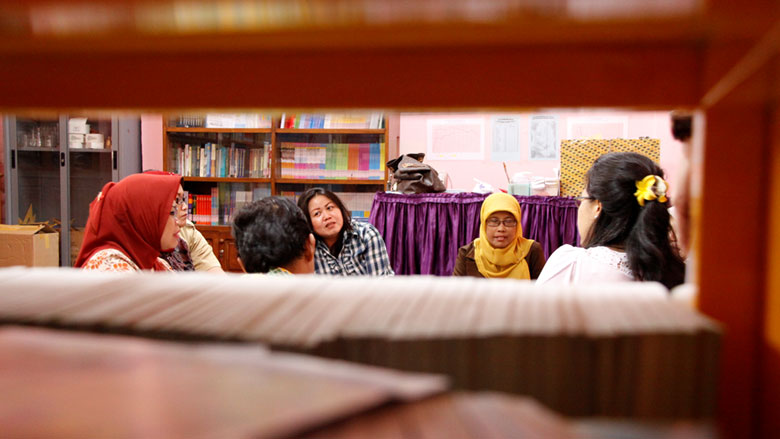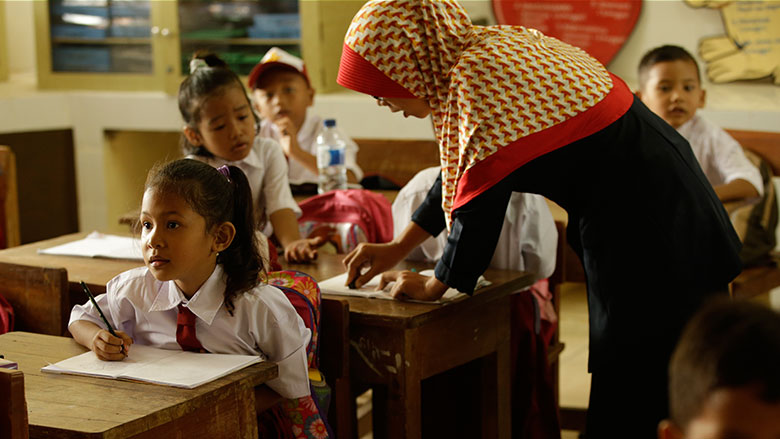Background
Over the past 15 years, Indonesia has implemented major policy reforms to improve education. These include a constitutional mandate to spend 20 percent of the national budget on education, decentralizing some functions of the education sector to the district and school level, and implementing the Teacher Law in 2005. The government has also increased resources to schools with the School Operational Assistance Grant (Bantuan Operasional Sekolah, or BOS) program and supported parents enrolling their children in schools through the Smart Indonesia Program (Program Indonesia Pintar, or PIP).
Through these reforms, Indonesia’s education expenditures have increased significantly in the past 15 years. By 2018, spending on education was greater than any other sector, approximately meeting the 20 percent target of total government expenditure. However, since the national budget is 15 percent of GDP, this education expenditure is only 3 percent of GDP, one of the lowest in the region.
While the reach of Indonesia’s education system has increased, major implementation challenges persist. Between 2001 and 2017, enrolment increased by 23 percent, or 10 million students, accompanied by only a modest increase in quality. The country’s Program for International Student Assessment (PISA) scores rose during this period, but at its current pace Indonesia will only reach average Organization for Economic Co-operation and Development (OECD) country scores in 60 years.
To reach its education potential, Indonesia will need to improve teaching and learning environments, school management, and coordination across levels of government. Decentralization has created enormous challenges linked to capacity, as well as weak systems of checks and balances in education service delivery.
Practical solutions to these problems are needed for the Indonesian education system to move forward. These include selecting only the highest quality candidates to become teachers, orienting school, district and province level to efficiently plan and budget to achieve national standards in education, and delivering effective programs of technical support for teachers and schools to improve student learning.
The World Bank’s Support to Indonesia’s Students and Teachers
The World Bank works to improve teaching and learning in Indonesia through the Improving Dimensions of Teaching, Education Management, and Learning Environment (ID-TEMAN) program, financed by the Australian government and World Bank funds. Started in 2016, it builds on research and analytical work conducted by the World Bank in collaboration with the Indonesian Ministry of Education and Culture since 2005. It aims to support Indonesia to reach its education potential by improving teaching and learning through better policy, operations and implementation.
The program supports the Government in addressing challenges to delivering better education outcomes, with a view to Indonesia achieving its medium-term development plan targets in education service delivery.
The World Bank’s support to the Indonesian Government focuses on two key areas:
- Effective teaching and learning processes, focusing on teacher competencies. This includes support to enhance continuous professional development for in-service teachers, analyzing and strengthening professional preparatory programs for pre-service teachers, reviewing and informing the implementation of Indonesia’s Teacher Law of 2005 and establishing student learning profiles.
- Improving the delivery of education for all, including school management, financial transfers and teacher deployment. This work area includes a planned sub-national public expenditure review and on-demand assistance to the Ministry of Education and Culture.
In March 2017 ID-TEMAN co-hosted with the Ministry of Education and Culture and the Australian Government a two-day Learning for All conference in Jakarta where 170 national and international participants discussed improved efficiency of spending and the quality of education in Indonesia through shared practical experiences. |
|---|
Collaborations
ID-TEMAN also collaborates with Local Solutions to Poverty at the World Bank to implement the Kiat Guru pilot in conjunction with the Ministry of Education and Culture. Through Kiat Guru, the World Bank tested pay-for-performance mechanisms in rural areas of Indonesia. This engagement will be expanded to include an urban pilot of performance pay in order to develop successful Indonesian models for improving education outcomes supported by other Australian Government financed Trust Funds.
The World Bank, the Ministry of Education and Culture and the Ministry of Villages collaborated on the Early Childhood Education and Development Frontline pilot program (PAUD Generasi Cerdas Desa). Supported with financing from the Australian Government through Local Solutions to Poverty, the project increases the availability of high-quality, affordable professional development for early childhood community teachers by: enhancing existing government teacher training programs, strengthening local capacity to deliver training at the district level, and introducing community participation in the service delivery process.

Teacher training session, Bogor (Java), 2017
Emerging Results from this Support
Increased school management information and coordination from the local to the national level is needed. The capacity of the Ministry of Education and Culture to guide, monitor and supervise the education sector is hampered by insufficient information and coordination, particularly with local governments and schools.
- ID-TEMAN is identifying coordination gaps and working together with the Ministry of Education and Culture on strategies to close these gaps.
Inadequate coordination and teacher training continue to impact the effectiveness of the Teacher Law.
- ID-TEMAN has been strengthening the capacity of the Ministry of Education and Culture’s Centers for the Development and Empowerment of Teachers and Education Personnel (PPPPTK) of Science and Mathematics for the continuous professional development of in-service teachers.
- ID-TEMAN has also provided policy recommendations to the Ministry on the following areas of teachers’ governance: data, demand, qualification, recruitment, career development, reward and welfare, affirmative action, professional associations and community engagement.
Processes for identifying teacher demand, allocation, recruitment, and distribution need to be improved.
- Policy recommendations to the government include: improving teacher data accuracy, increased coordination and communication among relevant ministries and local governments; implementing a performance-based recruitment system for civil servant teachers, standardizing non-civil service teacher recruitment, and improving teacher deployment to ensure more equitable education quality distribution.
- A situational analysis was also conducted on pre-service teacher education (with a focus on teacher Professional Preparatory Program, or PPG) by the Lembaga Pendidikan Tenaga Kependidikan or Teacher Training Colleges and an intensive discussion about challenges in the implementation of pre-service teacher training was held in
November 2017.
While the flow of resources to schools has increased, there is little guidance on how to use them. Many schools continue to lack the capacity to develop plans and budgets to use these resources to achieve the National Service Standards.
- ID-TEMAN has leveraged the World Bank’s existing work on supporting the Government of Jakarta to improve school-based planning and budgeting through a web-based tool named e-RKAS (electronic school planning and budgeting). In collaboration with the Ministry of Education and Culture, the tool is being tested in five districts. The cost settings are tailored to each district to enable accurate, goal-oriented planning and school expenditure tracking. The approach was first developed in Surabaya and DKI Jakarta, and is expected to be expanded to more districts.
